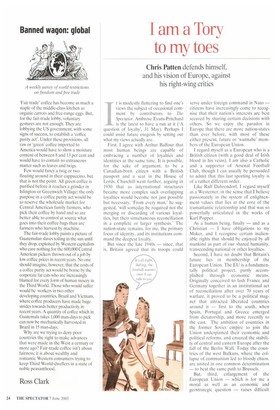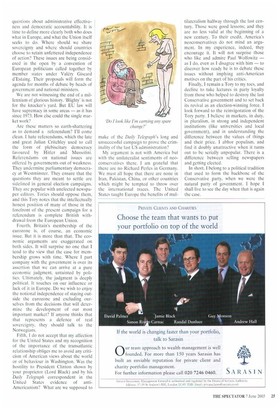I am a Tory to my toes
Chris Patten defends himself, and his vision of Europe, against his right-wing critics I.t is modestly flattering to find one's views the subject of occasional comment by contributors to The Spectator. Ambrose Evans-Pritchard
is the latest to have a run at it CA question of loyalty', 31 May). Perhaps I could assist future exegesis by setting out what my views actually are.
First, I agree with Arthur Balfour that most human beings are capable of embracing a number of loyalties and identities at the same time. It is possible, for the sake of argument, to be a Canadian-born citizen with a British passport and a seat in the House of Lords. Churchill went further, arguing in 1930 that as international structures became more complex such overlapping loyalties would become not just possible but necessary. 'From every man,' he suggested, 'will someday be required not the merging or discarding of various loyalties, but their simultaneous reconciliation in a complete or larger synthesis.' The nation-state remains, for me, the primary focus of identity, and its institutions command the deepest loyalty.
But since the late 1940s — since, that is, Britain agreed that its troops could serve under foreign command in Nato — citizens have increasingly come to recognise that their nation's interests are best secured by sharing certain decisions with others. So we enjoy the paradox in Europe that there are more nation-states than ever before, with most of these either present, future or vannabe' members of the European Union.
regard myself as a European who is a British citizen (with a good deal of Irish blood in his veins). I am also a Catholic and a supporter of Arsenal Football Club, though I can usually be persuaded to admit that this last sporting loyalty is of a rather different order.
Like Ralf Dahrendorf. I regard myself as a Westerner, in the sense that 1 believe passionately in the system of enlightenment values that lies at the core of the transatlantic relationship and that was so powerfully articulated in the works of Karl Popper.
As a human being, finally — and as a Christian — I have obligations to my Maker. and I recognise certain inalienable rights that should be enjoyed by all mankind as part of our shared humanity, transcending national or other loyalties.
Second, I have no doubt that Britain's future lies in membership of the European Union. The EU is a fundamentally political project, partly accomplished through economic means. Originally conceived to lash France and Germany together in an institutional act of reconciliation after over 70 years of warfare, it proved to be a political magnet that attracted liberated countries around it — first to the south, when Spain, Portugal and Greece emerged from dictatorship, and more recently to the east. The ambition of countries in the former Soviet empire to join the Union underpinned their economic and political reforms, and ensured the stability of central and eastern Europe after the fall of the Berlin Wall. Today the countries of the west Balkans, where the collapse of communism led to bloody chaos, are united in one common determination — to beat the same path to Brussels.
But, third. enlargement of the European Union — which is for me a moral as well as an economic and geostrategic question — raises difficult questions about administrative effectiveness and democratic accountability. It is time to define more clearly both who does what in Europe, and what the Union itself seeks to do. Where should we share sovereignty and where should countries choose to retain unfettered independence of action? These issues are being considered in the open by a convention of European politicians called together by member states under Valery Giscard d'Estaing. Their proposals will form the agenda for months of debate by heads of government and national ministers, We are not witnessing the end of a millennium of glorious history. 'Blighty' is not for the knacker's yard, But EU law will have supremacy in some areas — as it has since 1973. How else could the single market work?
Are these matters so earth-shattering as to demand a referendum? I'll come clean. I hate referendums, which the late and great Julian Critchley used to call the form of plebiscitary democracy favoured by Hitler and Mussolini. Referendums on national issues are offered by governments out of weakness. They undermine parliamentary democracy at Westminster. They ensure that the questions they are meant to settle are sidelined in general election campaigns. They are popular with unelected newspaper editors. Tories should oppose them, and this Tory notes that the intellectually honest position of many of those in the forefront of the present campaign for a referendum is complete British withdrawal from the European Union.
Fourth, Britain's membership of the eurozone is, of course, an economic issue. But it is more than that. The economic arguments are exaggerated on both sides. It will surprise no one that I tend to the view that the case for membership grows with time. Where I part company with the government is over its assertion that we can arrive at a pure economic judgment, untainted by politics. Ultimately, the judgment is deeply political. It touches on our influence or lack of it in Europe. Do we wish to enjoy the notional independence of staying outside the eurozone and excluding ourselves from the decisions that will determine the development of our most important market? If anyone thinks that that represents a defence of real sovereignty, they should talk to the Norwegians, Fifth, I do not accept that my affection for the United States and my recognition of the importance of the transatlantic relationship obliges me to avoid any criticism of American views about the world or of behaviour in Washington. Was the hostility to President Clinton shown by your proprietor (Lord Black) and by his Daily Telegraph correspondent in the United States evidence of antiAmericanism? What are we supposed to make of the Daily Telegraph's long and unsuccessful campaign to prove the criminality of the last US administration?
My argument is not with America but with the unilateralist sentiments of neoconservatives there. I am grateful that there are no Richard Perles in Germany. We must all hope that there are none in Iran, Pakistan, China, or other countries which might be tempted to throw over the international traces. The United States taught Europe the benefits of mul
tilateralism halfway through the last century. Those were good lessons; and they are no less valid at the beginning of a new century. To their credit, America's neoconservatives do not mind an argument. In my experience, indeed, they encourage it. It will not surprise those who like and admire Paul Vv'olfowitz — as I do, even as I disagree with him — to discover how ready he is to debate these issues without implying anti-American motives on the part of his critics.
Finally, I remain a Tory to my toes, and decline to take lectures in party loyalty from those who helped to destroy the last Conservative government and to set back its revival as an election-winning force. I look forward to the reinvigoration of the Tory party. I believe in markets, in duty, in pluralism, in strong and independent institutions (like universities and local government), and in understanding the difference between the values of things and their price. I abhor populism, and find it doubly unattractive when it turns out to be serially unpopular. There is a difference between selling newspapers and getting elected.
In short, I belong to a political tradition that used to form the backbone of the Conservative party, when we were the natural party of government. I hope I shall live to see the day when that is again the case.











































































 Previous page
Previous page